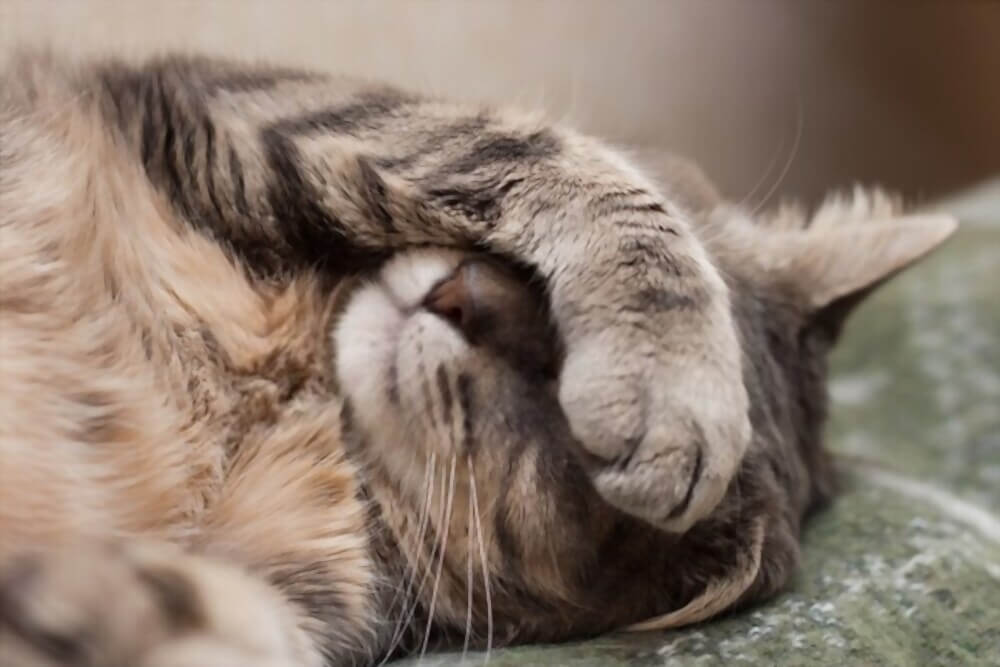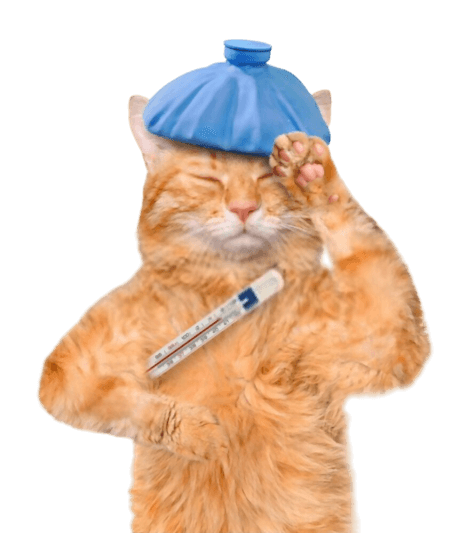Cats are known to be one of the moodiest pets and somewhat challenging to handle or take care of.
They can’t come up to us and tell us if something is wrong. So it is up to the cat owner to know when the cat is acting differently and needs help and attention!
Another fun fact is that cats have an instinct to hide their illness as a defense mechanism against predators or threats.
This is an instinct that is useful out in the wild, but not so much in a household with a loving owner, is it?
Not having this instinct would be so much more helpful to us anyway.
Cats also might not exactly understand that they are sick when they are unless it is awful or hurts a lot.
Unlike humans, they aren’t capable of understanding that a little pain can worsen if not attended to.
So how do you know when your cat is sick? There are some symptoms you can look out for.
SICK CAT SYMPTOMS – 16 Signs You Should Watch Out For

If your cat has not been eating for more than 24 hours, it will be a concern. When cats feel sick, they generally stop eating.
You could take that as a symptom of sickness and pay a visit to the vet. Loss of appetite is common among cats, but too much can lead to a condition called fatty liver.
Your cat might be refusing food for many reasons, such as gastrointestinal pain, gum disease, change in environment, depression, stress, etc.
- Not eating can lead to feeling weaker and loss of appetite, which makes your cat eat less throughout the day. This cycle must be stopped!
- Overeating can also be suspicious, especially in older cats. If you see a sudden increase in appetite in your pet, you should check her health status. It is not something that you can casually overlook. Try to control it at least for the sake of preventing obesity or overeating.
- Another symptom to look out for is any unexpected changes in weight. If your cat suddenly gains or loses a lot of weight, it is a matter of concern. Weight loss is a more immediate crisis than weight gain, but both are symptoms.
- Lethargy is a sign of possible health problems. Your cat may be less active than he or she used to be, sleep more, or have lower stamina in general. This could indicate some sort of weakness too. It may mean that the diet needs to be improved.
- If your cat is more thirsty than usual, that might be a sign of kidney or urinary tract illness too! Many cats might not drink so much water, so if you see a new and increased thirst in your feline, she might need to get checked out medically.
- Diarrhoea is another obvious sign of illness in a feline. It may mean that your pet has intestinal parasites, dietary problems, etc. If you do nothing about it, it will get worse. It can lead to dehydration and internal inflammation. Take a stool sample immediately to your vet and take care of the situation. Otherwise, diarrhoea can make your pet too weak, and things may get serious!
- Vomiting is as frequent a sign of sickness in cats as much as it is in humans. Because it is not a normal scenario to see cats throwing up. If you see one doing so, he or she is sick and needs care.
- Urinating too much or too little, having blood in urine, sudden changes in the quantity of urine are all symptoms of illness. Cats can suffer from urinary tract diseases or have kidney problems. If you find your cat trying to pee but nothing is coming out, it is time to be seriously concerned. This type of straining calls for immediate care, especially in male adult cats.
- Sick cats may show changes in breathing. For example, heavy breathing, wheezing, raspy breathing, shortness of breath, and so on.
- Discharge from the nose or the eyes is another symptom. This might mean that your cat has a contagious upper respiratory infection or some type of cat flu. Wipe the discharge with some warm salt and water solution.
- The flu can worsen your feline’s appetite and cause it to eat much less. Keep other cats away from your sick cat if you have more than one! You wouldn’t want to deal with a house full of sick pets.
- Increasing vocalization can mean that your cat is sick, in pain, or under stress. Get your pet checked out to make sure it is nothing but playfulness.
- Over-grooming can also be seen as a sign. It is perfectly normal for cats to over-groom sometimes, but it is also vital to check whether she is suffering from a skin problem or not. Your pet might be doing it out of pain as well.
- Never avoid any kind of swelling in any part of the body in your cat. It could be possible that it is a tumour. Or a wound that was not attended to got worse. If you see your pet in pain when you touch a swollen area, or if the swelling is hot to the touch, see your vet!
- Bad breath is another sign of dental hygiene issues.
- Excessive bleeding and drooling from the mouth is also concerning. It can lead to other problems in the heart and other organs.
Cat Vomiting And Diarrhea:
Taking some simple actions can help prevent the illness from getting worse in a short time.
For example, at a time like this, the pet owner should try to keep the pet hydrated. If your cat is refusing tap water, maybe offering mineral water will do the trick.
If you see your cat being unable to drink water or eat when sick, try helping her out by using a syringe to inject her with liquid cat food and water. Either way, she should not stay dehydrated.
If nothing works and vomiting does not stop, consult the vet, and get medications.
For cats suffering from these two conditions, try not to force them with food since they aren’t able to keep it inside in any way. Offer some bland food, or blended into liquid form after 24 hours.
How To Make Your Sick Cat Eat – What To Feed & How To Treat Your Feline Friends At Home

1. Try to make the cat food as appealing as you possibly can. It would be even better if you can personalize it according to YOUR cat’s favourite food, smell, and flavour. Include something irresistible to the prescribed diet that your pet simply can not refuse.
2. If your cat has a blocked nose and can’t smell food properly, it will lose appetite faster. The smell makes the diet more enticing to them. Generally, older cats are also known for having a weaker sense of smell.
So it is a good idea to add fish, tuna, chicken broth, etc. to the diet to make it look more attractive! Onions and garlic should be avoided because it is toxic to cats.
3. Offer liquid food or food that human babies eat to your sick cat. Swallowing soft and moist food would be much easier for a cat facing difficulty eating and drinking or is throwing up.
Liquid food is especially crucial for cats suffering from kidney problems.
4. Make the cat food wet and stinky in the right way! Try to add some seafood, roasted chicken, raw liver, canned tuna to enrich the stank. Wet food looks more attractive to them.
5. Warming the food up a little will make it much more attractive. Warm, soft, and wet food is also easier to swallow when sick.
6. Many people believe that hand-feeding encourages them to eat more than just leaving cat food in a bowl. Try to talk to your cat and say calming things. Emotional support or sentiment can play an essential role at the time of sickness. It may feel more comforting to them. Cats need to feel secure sometimes to feel a calm mood.
5. Try to give your cat medications to stimulate its appetite. Your vet may prescribe mirtazapine or cyproheptadine. Mirtazapine is a medicine that humans use, but small doses of it are known to be a stimulant of appetite in cats. It also helps with nausea. These will help to improve pet nutrition drastically. It is usually considered or used as a last resort; when no other measure seems to work.
6. You can also consider tube feeding as an option if nothing else works. It may sound scary, but it has had excellent outcomes.
7. If your cat is vomiting, try bland food with fewer fiber levels to help digest easily.
8. Try to make sure your cat feels at home”. In the sense that nothing new and different should exist in the environment that makes your cat feel nervous and lose appetite. To help your cat relax, it is essential to ensure that she isn’t stressed. Try to use familiar things like the regular food bowl, room, couch, or her favorite sofa.
9. Try keeping the delicious-smelling meal under the nose of a sleepy cat. This is known to be an excellent technique to lure them into digging in.
10. Try to offer little amounts of food to your cat but often. Lack of appetite will make food less attractive to them, but they are still hungry. So offering different types of food after short intervals may convince them to try it out a few times.
11. Variety is also essential to tempt an uninterested cat into eating. It could be that most food seems boring to them when they’re sick. But new and different types of food are more likely to convince them to eat some.
One of the most common mistakes people generally make is postponing the visit to a vet.
If you see any signs of illness in your pet, please don’t delay a trip to the doctor because that would only worsen your cat’s condition and make it harder to recover.
Seek help and give help to your pet!



